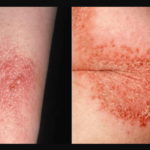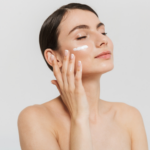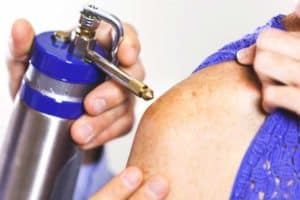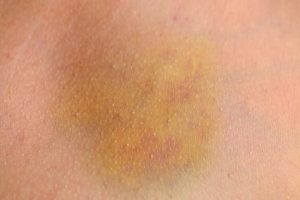A burning sensation is a pain so distinct that you feel it just by reading the words. It is categorically different from aching, stinging, or stabbing pains. It’s most common for a burning sensation to feel like a sunburn, but some say it feels like pins and needles or hot skin without fever.
A burning sensation on the skin that feels like sunburn can have a variety of causes. Possible causes include a reaction to an insect bite, certain chemicals, or plants such as poison ivy. Other causes may be attributed to your actual skin condition, such as skin dryness, rosacea, or eczema.
Possible treatments for the burning skin sensation include soothing creams, cool compresses, stress and anxiety management, avoiding irritating substances, and more. The right treatment for you depends on your underlying cause, which I will list later in the article.
If you or someone you love has ever uttered something like “my skin feels like it’s burning” and are confused about what caused it, then read on to know the possible causes and treatments available for it.
Also, for excellent relief for burning sensation, take a look at our top pick, the ELEMIS Skin Nourishing Milk Bath:
Click here to see it on Amazon.
Burning Sensation on Skin Feels like Sunburn – Possible Causes
Each day, our skin continuously comes in contact with a lot of elements–be it organic or artificial. Skin irritation without proper and prompt treatment may lead to the feeling best described as a burning sensation on the skin that feels like sunburn but isn’t.

Different things can cause this burning sensation, and they are classified into the following categories:
1. Environmental Causes
Some elements present in our environment can cause adverse reactions to the skin, especially for those with heightened skin sensitivity.
Certain plants and insects are known to be natural irritants, so it might be a good idea to avoid them or at least get to know how to protect yourself from possible irritation that leads to a burning sensation. Here are the common plants and insects that can cause skin irritation:
Poison Ivy
In case your skin comes in contact with poison ivy, you can be sure to experience symptoms, such as big red streaks, rashes, blisters, and inflammation.
You can also experience a burning sensation on the skin that feels like sunburn, or the skin feels like sunburn but isn’t, or skin feels hot but no fever.
But not everyone gets an allergic reaction to poison ivy. About 85 percent of Americans are allergic to it, while there is still 15 percent of the population that is resistant to its effects.
Thunderwood
Also called poison sumac, thunderwood has a very similar effect to poison ivy. It’s mainly found in the southern part of the United States. Symptoms tend to appear 24 to 72 hours after exposure. Its symptoms include developing long, itchy red lines, which is the area where your skin brushed against the plant.
Bee Sting
About 2 million Americans are allergic to the venom of stinging insects like bees. But even if you’re not allergic to it, a small bee sting can be painful and irritating.
After the first sharp pain, the skin feels hot due to the chemical called melittin. This venom instantly triggers pain receptors on our skin, causing a burning sensation.
Spider Bite
Most of the 3,000 species of spiders in the United States are not particularly dangerous. But if you do encounter a venomous one and it stings you, you might not feel its effect until a few hours later.
You may feel your skin feels sunburned with constant itching, redness, and burning pain in the area. But these usual symptoms may also be accompanied by more severe symptoms, such as muscle pain, difficulty breathing, swollen lymph nodes, and fever.
If you experience any of these sensations or symptoms, check into a medical facility.
2. Artificial Causes
If your skin feels like it’s burning, I would most likely associate it with an insect bite, something I ate, or even the actual sun. But what most people and I overlook is that irritants are also present in everyday products, such as lotions, perfumes, and detergents.
Certain chemicals incorporated in personal care and home products can cause a burning sensation on skin that feels like sunburn. Below are some examples of these products:
Acids
Overusing skincare products with an acid content, such as salicylic acid (for treating oily and acne-prone skin) and glycolic acid (promote skin peeling), can irritate the skin. Using these acid-based products can further lead to skin redness, dryness, and burning sensation.
Fragrance
About half of available personal care and home products in the market are a blend of natural and synthetic aromatic ingredients. Synthetic ingredients can trigger skin irritation in about 20 percent of Americans.
3. Psychological Causes
Our skin is a reflection of our bodies’ situation on the inside. Always feeling anxious or stressed can affect the look and feel of our skin in many ways. It may be simple at first, but it can escalate to more severe conditions if not addressed right away.
If you ever find yourself thinking, “my skin feels like it’s burning,” try to pause and think about how you might be feeling in the moment. If you are anxious about something or just feeling stressed about life in general, remember that your skin could be giving you a sign.
4. Physiological Causes
Last but not the least of possible causes of burning sensation on skin are physiological conditions, both external and internal.
Some conditions are relatively easy to treat and bounce back from, but some may need extensive and continued medication. We will discuss other causes and possible treatments for these conditions in the sections below.
Rosacea
Rosacea is a relatively common skin disease that may fade and relapse through time. It is mainly characterized by red and pus-filled bumps on affected areas of the body. Symptoms include redness, dry and scaly texture, facial flushing, and the feeling of sunburned skin.
Sunlight is one of the triggers for this condition to relapse. Other triggers are spicy foods, alcoholic drinks, and even stress.
Eczema
Different stages of this condition affect about 31.6 percent of Americans. People of all ages may develop this condition, but it is not contagious.
Symptoms include red patches of dry and scaly skin, including rashes on different parts of the body. Because of extreme itchiness and constant scratching, affected areas may feel hot, which is similar to the feeling of burning skin.
Multiple Sclerosis
This highly progressive and degenerative autoimmune disease is characterized by numbing or tingling pains, spasms, bladder issues, vision problems, and other symptoms that vary in intensity and duration.
It’s a condition that causes long-term nerve damage, which can lead to a burning sensation on skin that may recur over time.
Cellulitis
Cellulitis is a bacterial infection that develops in the deepest layer of the skin, including the fat and soft tissues underneath. It can cause a very intense burning sensation on the skin that feels like sunburn. Without treatment, the infection can spread rapidly and lead to sepsis.
Possible Treatments for Burning Sensation on Skin That Feels like Sunburn
Due to a wide range of possible causes for burning sensations on skin, therapy and treatments must be promptly provided, especially for ones that need immediate attention.
Below are some of the best medical treatments and home remedies to help alleviate simple to severe cases of burning sensation on skin.
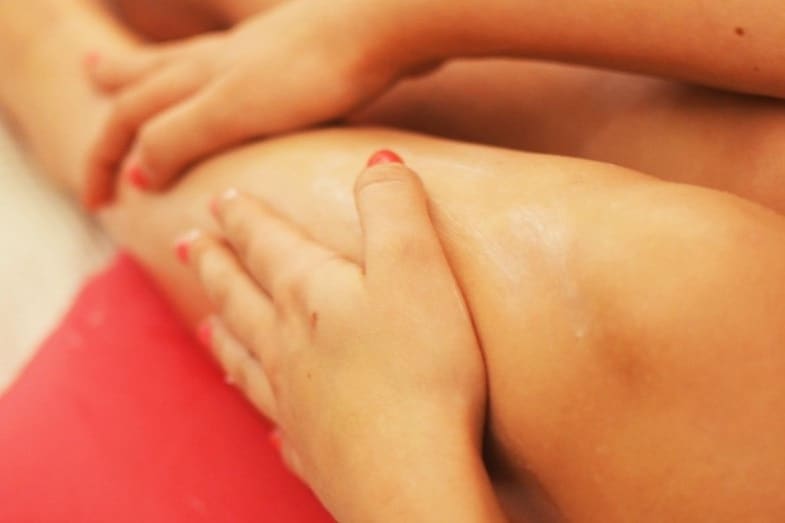
1. For Environmental Causes
Itching and burning sensations caused by poison ivy, thunderwood, and other plant irritants, usually subside in about two to three weeks.
But since it may be difficult to deal with the pain and can disrupt your sleep, you can try the following four treatments to help ease the burning sensation and itching:
- Apply calamine lotion to the affected area.
- Use an oatmeal-based product in a cool water bath.
- Place a cool, wet compress to the affected area for 15 to 30 minutes several times a day or as needed.
- Take oral antihistamines to help you sleep better.
If you are stung by a bee or spider, you will immediately notice that your skin feels hot, but you don’t have a fever. Your skin feels hot but no fever exists, or skin feels like sunburn but nothing there, including no rash or sign of the insect bite.
First, you must wash the affected area thoroughly with soap and water. Use ice on the affected area to reduce swelling and stop venom absorption. An antibiotic ointment is essential if blisters develop on the bitten area.
Some of the natural remedies for stings that many swear by include:
- Honey – Helps alleviate painful swelling and promotes faster healing of the wound.
- Apple Cider Vinegar (ACV) – Can help neutralize bee venom. Soak a clean cloth or bandage in ACV then apply it to the affected area for 15 minutes.
- Aloe Vera – Can soothe and relieve pain in the affected area.
- Tea Tree Oil – A natural antiseptic that may ease the pain on the sting site. Mix tea tree oil with a carrier oil, such as olive or coconut oil, before applying to the affected area.
- Baking Soda – Can help reduce itching and swelling. Make a paste using baking soda and water. Apply the water-baking soda paste to the affected area and cover it with a clean bandage. Leave the baking soda paste on for 15 minutes.
2. For Artificial Causes
If your skin feels sunburned due to synthetic chemicals present in personal care and home products, the best solution is to avoid it next time. You can be a smarter consumer by following these simple steps:
- Always Check the Label – Look for more natural ingredients. Choose products that are free from fragrance and strong acids.
- Try Before you Buy – Most skincare products have in-store samples you can try before buying. Conduct a simple patch test on your elbow first and wait for at least 48 hours. If you don’t experience itching, burning sensations, or other adverse effects on your skin, then the product is safe for you to use.
3. For Psychological Causes
Your wellbeing should be of top importance as it can affect every aspect of your life, including your skin’s health. If you are anxious, constantly stressed, and you already feel its adverse effects on your skin, you should take some time to unwind and relax.
Take some time off and boost your skin health by eating healthier, clearing your mind, and addressing other skin conditions that might stem from your anxiety.
You can also check with your therapist for better stress and anxiety management. Consulting a dermatologist can also help and monitor your overall skin health.
4. For Physiological Causes
To effectively treat physiological causes of burning sensations on the skin, it’s best to get yourself checked by a doctor to determine specific health issues that negatively affect your skin health.
Antibiotics and other prescription drugs are often used to treat certain skin conditions, such as cellulitis or bacterial kin infection. [1] The symptoms associated with eczema and rosacea can be treated using over-the-counter moisturizers, creams, and hypoallergenic soaps.
Conclusion – Burning Sensation on Skin Feels like Sunburn
So are you experiencing a burning sensation on your skin, similar to a sunburn, or your skin feels hot but no fever? If so, here are some non-sunburn causes of burning sensation on skin:
- Poisonous plants (e.g., poison ivy)
- Insect bites (e.g., spiders)
- Chemicals such as acid and fragrance in personal care (e.g., perfume) and home (e.g., laundry detergent) products
- Stress and anxiety
- Skin conditions such as rosacea, eczema, and cellulitis
- Nerve damage due to autoimmune diseases like multiple sclerosis
Here are some possible treatments or things to keep in mind to avoid the burning sensation on skin:
- Use an oatmeal-based product in a cool water bath.
- Apply calamine lotion to the affected area.
- Place a cool, wet compress to the affected area for 15 to 30 minutes several times a day or as needed.
- Take oral antihistamines to help you sleep better.
- If you already have an existing skin condition or allergy, and you’re away from home, make sure to bring with your medications, such as antihistamines and topical creams to alleviate inflammation and itchiness.
- Choose more natural alternatives to perfumes and lotions, including laundry detergents, to ensure that you keep away from allergens caused by harsh chemicals.
- Our negative thoughts and feelings can also affect our skin health. Make time for meditation when you’re feeling anxious, tired, or stressed. And if you can’t, just take a deep breath and regroup your thoughts before going back to your busy day.
These simple tips can help you determine the cause of that burning sensation on your skin. The next time your skin feels hot with a burning feeling or sensation, try to pinpoint the cause, and it will lead you to its remedy.
If the sensation persists, despite having tried different home remedies and treatments, then see a doctor who can diagnose and suggest custom treatments for your specific issue.
Related reading:
Skin Feels Prickly but No Rash [9 Causes and Treatments]
I Feel Like Bugs Are Crawling on Me but Nothing Is There
Feels Like Something Is Biting Me but Nothing Is There




![Neutral Skin Tone Defined [and Best Colors for Neutral Skin] neutral skin tone](https://skincaregeeks.com/wp-content/uploads/2021/05/neutral-skin-tone-150x150.png)

